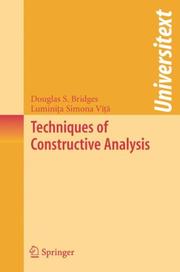| Listing 1 - 4 of 4 |
Sort by
|
Book
ISBN: 0387381473 Year: 2006 Publisher: New York, NY : Springer New York : Imprint: Springer,
Abstract | Keywords | Export | Availability | Bookmark
 Loading...
Loading...Choose an application
- Reference Manager
- EndNote
- RefWorks (Direct export to RefWorks)
This text provides a rigorous, wide-ranging introduction to modern constructive analysis for anyone with a strong mathematical background who is interested in the challenge of developing mathematics algorithmically. The authors begin by outlining the history of constructive mathematics, and the logic and set theory that are used throughout the book. They then present a new construction of the real numbers, followed by the fundamentals of the constructive theory of metric and normed spaces; the lambda-technique (a special method that enables one to prove many results that appear, at first sight, to be nonconstructive); finite- dimensional and Hilbert spaces; and convexity, separation, and Hahn-Banach theorems. The book ends with a long chapter in which the work of the preceding ones is applied to operator theory and other aspects of functional analysis. Many results and proofs, especially in the later chapters, are of relatively recent origin. The intended readership includes advanced undergraduates, postgraduates, and professional researchers in mathematics and theoretical computer science. With this book, the authors hope to spread the message that doing mathematics constructively is interesting and challenging, and produces new, deep computational information.
Calculus. --- Mathematical analysis. --- 517.1 Mathematical analysis --- Mathematical analysis --- Analysis (Mathematics) --- Fluxions (Mathematics) --- Infinitesimal calculus --- Limits (Mathematics) --- Functions --- Geometry, Infinitesimal --- Logic, Symbolic and mathematical. --- Global analysis (Mathematics). --- Mathematics. --- Functional analysis. --- Operator theory. --- Mathematical Logic and Foundations. --- Analysis. --- Real Functions. --- Functional Analysis. --- Operator Theory. --- Functional analysis --- Functional calculus --- Calculus of variations --- Functional equations --- Integral equations --- Math --- Science --- Analysis, Global (Mathematics) --- Differential topology --- Functions of complex variables --- Geometry, Algebraic --- Algebra of logic --- Logic, Universal --- Mathematical logic --- Symbolic and mathematical logic --- Symbolic logic --- Mathematics --- Algebra, Abstract --- Metamathematics --- Set theory --- Syllogism --- Mathematical logic. --- Analysis (Mathematics). --- Functions of real variables. --- Real variables

ISBN: 9780387336466 038733646X Year: 2006 Publisher: New York (N.Y.) : Springer,
Abstract | Keywords | Export | Availability | Bookmark
 Loading...
Loading...Choose an application
- Reference Manager
- EndNote
- RefWorks (Direct export to RefWorks)
This book is an introduction to constructive mathematics with an emphasis on techniques and results that have been obtained in the last twenty years. The text covers fundamental theory of the real line and metric spaces, focusing on locatedness in normed spaces and with associated results about operators and their adjoints on a Hilbert space. Some of the other areas that are discussed in this book are the Ishihara's tricks, Separation theorems, and Locally convex spaces. There are two appendices to the book. The first gathers together some basic notions about sets and orders, the second gives the axioms for intuitionistic logic. The intended readership of the book consists of postgraduate or senior undergraduate students, and professional research mathematicians. No background in intuitionistic logic or constructive analysis is needed in order to read the book, but some familiarity with the classical theories of metric, normed and Hilbert spaces is recommended.
Digital
ISBN: 9780387381473 Year: 2006 Publisher: New York, NY Springer Science+Business Media, LLC
Abstract | Keywords | Export | Availability | Bookmark
 Loading...
Loading...Choose an application
- Reference Manager
- EndNote
- RefWorks (Direct export to RefWorks)
Mathematical logic --- Operator theory --- Functional analysis --- Mathematical analysis --- analyse (wiskunde) --- functies (wiskunde) --- wiskunde --- logica
Book
ISBN: 9780387381473 Year: 2006 Publisher: New York NY Springer New York
Abstract | Keywords | Export | Availability | Bookmark
 Loading...
Loading...Choose an application
- Reference Manager
- EndNote
- RefWorks (Direct export to RefWorks)
This text provides a rigorous, wide-ranging introduction to modern constructive analysis for anyone with a strong mathematical background who is interested in the challenge of developing mathematics algorithmically. The authors begin by outlining the history of constructive mathematics, and the logic and set theory that are used throughout the book. They then present a new construction of the real numbers, followed by the fundamentals of the constructive theory of metric and normed spaces; the lambda-technique (a special method that enables one to prove many results that appear, at first sight, to be nonconstructive); finite- dimensional and Hilbert spaces; and convexity, separation, and Hahn-Banach theorems. The book ends with a long chapter in which the work of the preceding ones is applied to operator theory and other aspects of functional analysis. Many results and proofs, especially in the later chapters, are of relatively recent origin. The intended readership includes advanced undergraduates, postgraduates, and professional researchers in mathematics and theoretical computer science. With this book, the authors hope to spread the message that doing mathematics constructively is interesting and challenging, and produces new, deep computational information.
Mathematical logic --- Operator theory --- Functional analysis --- Mathematical analysis --- analyse (wiskunde) --- functies (wiskunde) --- wiskunde --- logica
| Listing 1 - 4 of 4 |
Sort by
|

 Search
Search Feedback
Feedback About UniCat
About UniCat  Help
Help News
News